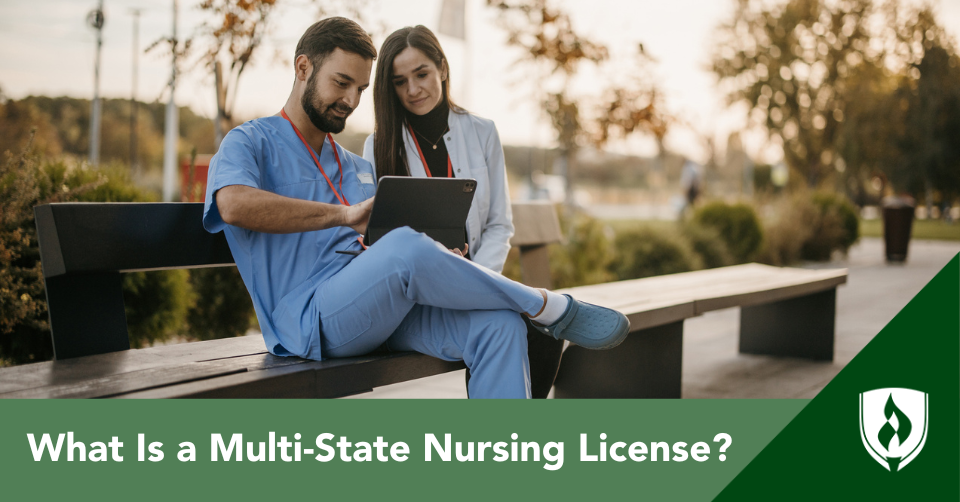
Whether you are already a nurse, a nursing student or an aspiring nurse weighing career options, you might well wonder about the fine print on how nursing licenses work. You can’t work as a nurse without that official documentation, so you want to get all the details right.
It can be overwhelming. If you’re confused by the state-to-state licensing requirements for nursing, you’re not alone. On one hand, getting a nursing license in Florida could look a bit different than pursuing a nursing license in Kansas or Minnesota.
But what if you want to make sure you can practice nursing in more than one state? For many aspiring nurses, becoming an RN where you live and still being free to work in other places is an important consideration.
This is where a multi-state nursing license (sometimes listed as a multistate or compact license) can help you out. Read on to learn how these nursing licenses work, how to get one and why you might want one.
What is a multi-state nursing license?
What if you could become a nurse in one state, move to another state and just keep on nursing, without re-applying for a whole new license?
The Nurse Licensure Compact (NLC)—previously called the Enhanced Nurse Licensure Compact (eNLC)—allows a nurse to have one multistate license with the ability to practice in their home state and other compact states, as stated by the National Council of State Boards of Nursing (NCSBN®).
A multistate license permits a registered nurse (RN) or licensed practical/vocational nurse (LPN/VN) to practice in both their home state and other eligible states. These eligible states are called NLC states or “compact states.” The two terms are interchangeable, and they refer to a group of states that have formally agreed to allow practice both physically and virtually across state lines.
This means that if you’re an RN living in a compact state, you can get a compact license (or multi-state) and can practice in all compact jurisdictions.
What states are currently compact states?
As of 2023, most states in the U.S. have an agreement with the compact. 41 jurisdictions are part of the NLC. Some are pending NLC legislation, some are enacted NLC and awaiting implementation and some are partially implemented. The only states with no current NLC action are Connecticut, Michigan, Nevada and California.
Many state’s statuses are in transition, but you can find a map of the participating jurisdictions and updates on each specific state through the NCSBN’s interactive map.
How do I obtain a compact license?
To be eligible for a multistate license, your home state—also referred to as your primary state of residence (PSOR)—must be an NLC state. Your PSOR is not necessarily where you went to nursing school, it’s instead the state where you hold a driver's license, are registered to vote and file federal taxes.1
So let’s say you grew up in Nevada (not a compact state as of this article), but you moved to Florida to attend nursing school in Fort Myers. If you adjusted your driver’s license, voter registration and the state on your federal tax filing to Florida and graduated your program, you’d be eligible to apply for a multistate license.
If you grew up in Minnesota (part of the compact), and kept your permanent residence there even through you moved out of state for nursing school—you could also be eligible for a multistate license through the MN nursing board.
Any registered nurses (RNs) and licensed practical/vocational nurses (LPN/VNs) who live in a compact state and meet the uniform licensure requirements may be eligible for multistate licenses.
If you’re a new graduate, you can apply for multistate licensure by examination, receiving authorization to test (ATT) in that state, passing the nurse licensure exam (NCLEX-PN® or NCLEX-RN®) and meeting those same licensure requirements.
Where is a compact license valid?
A multistate license issued by your primary state of residence is valid in all compact states. As long as that PSOR does not change and you remain in good standing, you can practice in all compact states with an active compact license.
A compact state nursing license is not valid in non-compact states. To practice in non-compact states, you must apply for a single-state license with the appropriate board of nursing. Regardless of whether you hold a compact license, you may obtain as many single-state licenses as you’d like.
It's worth reiterating that only nurses who declare a compact state as their PSOR may be eligible for a multistate license. If you’re a resident of a non-compact state, you may apply for a license by endorsement in a compact state. This will grant you a single-state license that’s valid in that state only—even if it is a compact state.
Similar to residents of compact states, residents of non-compact states may also obtain as many single-state licenses as they wish—they just will need to apply for each one separately.2
Do I need a multi-state license if I get my RN license in a compact state?
If you declare a compact state as your primary residence when you apply for your RN license and meet the licensure requirements of that state, the license you receive should be a multistate license.2
Of course, there are always exceptions—so be sure to stay informed each step of the way. Resources like nursys.com can tell you quickly and at no cost what type of license you hold.
If you receive a single-state license (despite your PSOR being an NLC state), you can contact your state board of nursing for instructions on how to convert your license to a multistate license. Most state nursing boards will have information for this on their website.
What is a travel nurse?
As you begin to do your research on multistate nursing licenses, you may come across information on travel nurses. Travel nurses are RNs from various clinical backgrounds, and they tend to work for independent staffing agencies.
Travel nurses are usually assigned to different states on a temporary basis, to fill in short-term employment gaps. They help provide patient care in areas where there are unfilled positions and the demand for nurses isn’t being met.
Does a travel nurse need a multi-state license?
A travel nurse does not necessarily need a multistate license, though they may want to consider getting one if they are eligible.
Travel nurses need to be licensed in any state where they’re accepting a contract, so rather than apply for single-state licenses in every state where they accept a new contract (each of which can take several weeks to receive), obtaining a multistate license can save valuable time—and allow them the flexibility to accept more assignments with shorter-term contracts.
Not only does obtaining a multistate license make the contracting process easier for travel nurses, it also makes them more desirable for staffing agencies to work with. The agencies won’t need to help with each individual license application, and they won’t need to leave client facilities waiting each time they hire a nurse for a new contract.
Of course, travel nurses accepting work in non-compact states will need to go through the application process regardless, but given how many more NLC states there are than non-compact states, a multistate license can still make a big difference.
Can RNs become travel nurses without going back to school?
If you’re already an RN or planning to become one, you won't need to go back to school to become a travel nurse since there’s no additional training or education required.3
Despite travel nursing not requiring a separate degree, nurses with a Bachelor of Science in Nursing (BSN) might have a wider array of options than nurses with only an Associate Degree in Nursing (ADN), as most magnet hospitals and large academic teaching hospitals prefer travel nurses with a BSN.
What is the first step to securing multi-state licensure?
This may seem like a lot of information, but if working across state lines appeals to you, remember square one: the first step to multistate licensure is becoming a nurse.
A good nursing program will support you from wherever you are in your nursing journey all the way to where you want to go—whether that’s a career as a travel nurse or a pathway to another specialty. A good program will also have faculty and advisors who can help you navigate licensing requirements wherever you plan to work as a nurse.
Nursing school can offer quite a few benefits and resources you may not have considered. Check out “11 Facts You Didn't Know About the Rasmussen University Nursing Programs” to get a closer look.
Additional Relevant Articles:
- What Exactly Does Nursing Licensure by Endorsement Mean?
- How To Get a Nursing License in Florida: Your Step-By-Step Guide
NCLEX-RN, NCLEX-PN and NCSBN are registered trademarks of National Council of State Boards of Nursing, Inc.
1NLC Nurse Licensure Compact, Primary State of Residence (PSOR) (2023) https://nursecompact.com/how-it-works.page [accessed August 9, 2023].
2NLC Nurse Licensure Compact, Frequently Asked Questions, https://nursecompact.com/FAQs.page [accessed August 9, 2023].
3How Do You Become a Travel Nurse? (2022) https://www.travelnursing.org/what-is-travel-nursing. [accessed August 9, 2023].




